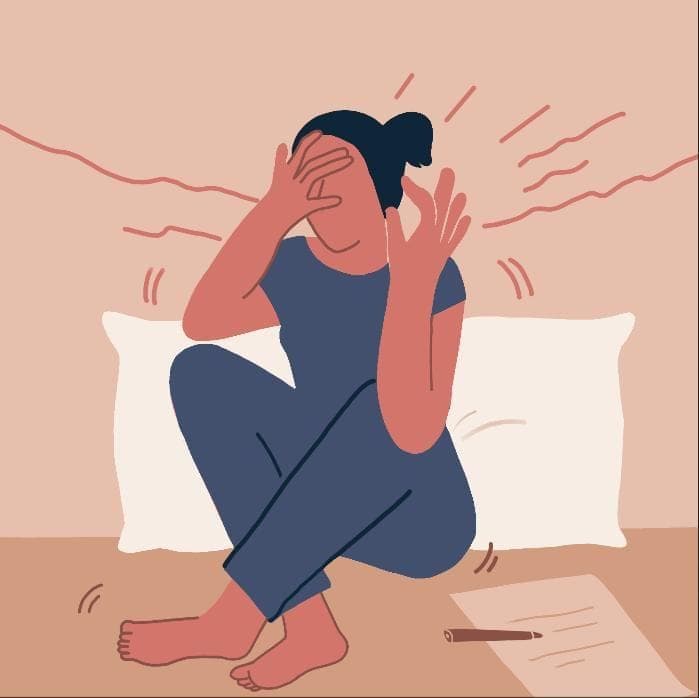You are heading for the airport and suddenly, out of the blue, your heart pounds, you can't breathe, and you may feel like you're dying or going crazy with mind numbing fear. You might be having a panic attack.
A panic attack is an intense wave of fear characterized by its unexpectedness and debilitating, immobilizing intensity. These attacks often strike out of the blue, without any warning, and sometimes with no clear trigger.
The symptoms of a panic attack may include:
- Sense of impending doom or danger
- Fear of losing control or dying
- Rapid, pounding heart rate
- Sweating
- Shortness of breath or tightness in your throat
- Chills
- Hot flashes
- Nausea
- Abdominal cramping
- Dizziness, lightheadedness or faintness
- Numbness or tingling sensation in the limbs
- Feeling of unreality or detachment
- Chest or abdominal discomfort
- Trembling hands and feet
One of the worst things about panic attacks is the intense fear that accompanies them. You may fear having panic attacks so much that you avoid certain situations where they may occur.
Panic attacks are usually triggered by a combination of factors.
Factors that may increase the risk of developing panic attacks or panic disorder include:
- Genetic factors, such as a predisposition towards anxiety or a family history of panic attacks or panic disorder.
- Social factors like a major life stressor such as death or an illness, a traumatic event, or a major life transition such as loss of a job or a shift to a different city.
- Left untreated, panic attacks and panic disorder can affect almost every area of your life.
- You may be so afraid of having more panic attacks that you live in a constant state of fear, ruining your quality of life.
Complications that panic attacks may cause or be linked to include:
- Development of specific phobias, such as fear of driving or leaving your home
- Frequent medical care for health concerns and other medical conditions
- Avoidance of social situations
- Problems at work or school
- Depression, anxiety disorders and other psychiatric disorders
- Increased risk of suicide or suicidal thoughts
- Alcohol or other substance misuse
- Financial problems

How to tackle panic attacks:
- Medications: Depending on the severity of panic attacks, a doctor may prescribe a use-as-needed medication. But always, always remember to consult a doctor first. Avoid self medication or over the counter medicines.
- Bring yourself back to the present. Focus on the physical sensations you are familiar with, like digging your feet into the ground, or feeling the texture of your jeans on your hands. These specific sensations ground you firmly in reality and give you something objective to focus on.
- When a person becomes overwhelmed with distressing thoughts, feelings, or memories, concentrating on something physical in the environment can help them feel grounded.
- Mindfulness can help ground you in the reality of what’s around you. Since panic attacks can cause a feeling of detachment or separation from reality, this can combat your panic attack as it’s approaching or actually happening.
- Breathing techniques like the 4-7-8 technique and deep belly breathing can also be very useful. Panic attacks can cause rapid breathing, and chest tightness can make the breath shallow. This type of breathing can make feelings of anxiety and tension worse. Instead, try to breathe slowly and deeply, concentrating on each breath. Breathe deeply into the abdomen, filling the lungs and the belly slowly and steadily while counting to 4, hold for 7, and breathe out from the mouth, taking the air out of the abdomen to a count of 8.
The 5-4-3-2-1 method is a type of grounding technique based on mindfulness
It helps direct the person’s focus away from sources of stress. To use this method, the person should complete each of the following steps slowly and thoroughly:
Notice 5 separate objects around you. Focus on the color and what they look like. Listen for 4 distinct sounds. Think about where they came from and what sets them apart. Touch 3 objects. Consider their texture, temperature, and what they feel like. Identify 2 different smells. This could be the smell of your coffee, your soap, or the laundry detergent on your clothes. Name 1 thing you can taste. Notice whatever taste is in your mouth, or try tasting a piece of candy.
- Using a sensory box
- A mantra is a word, phrase, or sound that helps with focus and provides strength. Internally repeating a mantra can help a person come out of a panic attack. The mantra can take the form of reassurance and may be as simple as, “This too shall pass.”
- Acknowledge that you are having a panic attack. Try acknowledging that this is a brief period of concentrated anxiety, and that it will be over soon.
- Picture your happy place: A person’s happy place should be somewhere they would feel most relaxed. The specific place will be different for everybody. It will be somewhere they feel relaxed, safe, and calm.
- When an attack begins, it can help to close the eyes and imagine being in this place. Think of how calm it is there.
- Be aware of your triggers: A person’s panic attacks may often be triggered by the same things, such as enclosed spaces, crowds. By learning to be aware of the triggers and avoiding them accordingly, people may be able to reduce the frequency and intensity of panic attacks.
- Muscle relaxation techniques: Practicing muscle relaxation techniques may help limit an attack.
When to see a doctor
If you have panic attack symptoms, seek medical help as soon as possible. Panic attacks, while intensely uncomfortable, are not dangerous. However, it still takes some effort to manage them on your own, and they may get worse without treatment. Moreover, the symptoms of a panic attack symptoms may resemble symptoms of other serious health problems, such as a heart attack.
Hence, it is important to consult a professional. Get treatment for panic attacks as soon as possible to help stop them from getting worse or becoming more frequent. Stick with your treatment plan to help prevent relapses or worsening of panic attack symptoms.
Stay grounded, stay safe, help is always at hand!
Disclaimer - This information is educational and should not be construed as medical advice. Please consult your doctor before making any dietary changes or adding supplements.
ProactiveForHer is a digital clinic for women, offering accessible, personalised, and confidential healthcare solutions. We offer out-patient care, diagnostic services and programs for various health concerns of Indian women, across their lifetime - from puberty to pregnancy to menopause.

